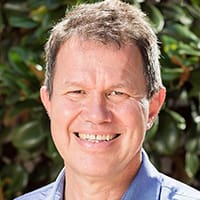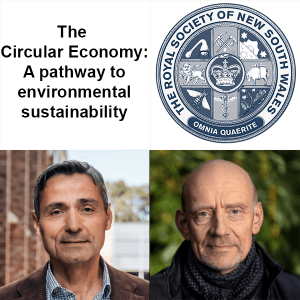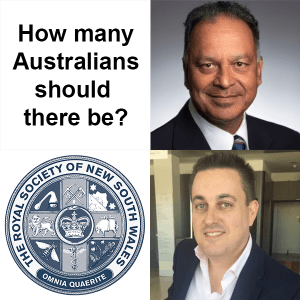
 “Planetary Health—Safeguarding Health in the Anthropocene Epoch”
“Planetary Health—Safeguarding Health in the Anthropocene Epoch”
Professor Tony Capon
Professor of Planetary Health and
Director, Sustainable Development Institute
Monash University
Date: Wednesday, 2 December 2020, 6.00 pm AEDT
Venue: Zoom Webinar
Video Presentation: YouTube Video
All are welcome
Summary: The rise of the global threat of pandemic viral disease is not the only issue confronting the modern world. There are a bundle of major related problems stemming from man’s successes in building a more comfortable existence. It is now apparent to many scientists that the drive to modify, utilise and control the resources of our planet, especially over the past few hundred years, is affecting the health of our planet. Planetary Health is a new field of inquiry that links a multiplicity of disciplines which observe changes in the well-being of life on Earth.
In this presentation, Professor Capon will introduce the findings of the Rockefeller Foundation–Lancet Commission on Planetary Health report, “Safeguarding human health in the Anthropocene epoch, and canvass their implications for the protection and promotion of future human health and wellbeing.“ To respond effectively to the health challenges of the Anthropocene, human societies need to grapple with the global transitions that are currently shaping our lives–demographic, epidemiological, food, energy, urban, economic, cultural and ecological. Humanity can chart a safe, healthy and prosperous course ahead by addressing unacceptable inequities in health and wealth within the environmental limits of the Earth. However, this will require the generation of new knowledge, the implementation of wise policies, decisive action and inspirational leadership.
Professor Capon’s presentation will be supported by a panel moderated by the Hunter Branch vice-chairman, Laureate Professor John Aitken, and consisting of Dr John Van Der Kellan, the president of the NSW branch of Doctors for the Environment Australia (DEA), and Ms. Georgia Brown, a medical student who is an the main mover in Code Green, the climate action arm of AMSA (Australian Medical Students Association).
<!– By most measures, human health is better now than at any time in human history. Since 1950, global average life expectancy has risen 25 years to its current level of 72 years, and global infant mortality rates have decreased from around 210 per 1000 live births to about 30 per 1000 now. However, these gains in human health have been unequally distributed, and have come at the high price of degradation of natural systems on a scale never before seen in human history. While there is ample evidence that the health of people is inextricably linked to the health of the environment, the human species now threatens to destabilise the Earth’s life support systems.
Published in 2015, The Rockefeller Foundation–Lancet Commission on Planetary Health report Safeguarding human health in the Anthropocene(1) epoch concludes that the continuing degradation of natural systems threatens to reverse the health gains achieved during recent decades. In short, we have mortgaged the health of future generations to realise economic and development gains in the present. Anthropogenic global changes–including climate change, ocean acidification, land degradation, water scarcity, biodiversity loss and toxic pollution of air, water and ecosystems–have direct and indirect health impacts. The consequences for future health are far reaching, ranging from increasing emergence of zoonotic diseases (such as COVID-19), food insecurity and malnutrition, to conflict and displacement. Those who are least responsible for driving these changes–poor people in developing countries–will be most vulnerable to their consequences.
Put simply, planetary health is the health of human civilisation and the state of the natural systems on which it depends. The Lancet Commission report assesses the threats to health and the prospects for development posed by the environmental upheaval caused by humanity, and outlines a range of policies to repair what damage can be repaired, adapt to the changes that cannot be prevented, and overcome the perverse economic and political incentives and disincentives that militate against solutions the benefit both the health of people and planet. There is much cause for hope because the Commission found that many projected environmental changes can be avoided, and that the connections between people and planet mean that solutions that benefit natural systems often also benefit human health and wellbeing. Wise policies to manage natural systems and steward the biosphere within safe planetary limits of change can help to safeguard future human health.
In this presentation, Professor Capon will introduce the findings of the Commission and canvass their implications for the protection and promotion of future human health and wellbeing. To respond effectively to the health challenges of the Anthropocene, human societies need to grapple with the global transitions that are currently shaping our lives–demographic, epidemiological, food, energy, urban, economic, cultural and ecological. Humanity can chart a safe, healthy and prosperous course ahead by addressing unacceptable inequities in health and wealth within the environmental limits of the Earth. However, this will require the generation of new knowledge, the implementation of wise policies, decisive action and inspirational leadership.
(1) The ‘Anthropocene’ is a proposed epoch that begins when human activities started to have a significant global impact on Planet Earth’s geology and ecosystems. More information is available from Waters CN et al. Science 2016; 351: 137.
–>
Professor Tony Capon directs the Monash Sustainable Development Institute and holds a chair in planetary health in the School of Public Health and Preventive Medicine at Monash University. A public health physician and authority in environmental health and health promotion, his research focuses on urbanisation, sustainable development and human health. He is a former director of the International Institute for Global Health at United Nations University (UNU-IIGH) and has previously held professorial appointments at the University of Sydney and Australian National University. He is a member of the Rockefeller Foundation–Lancet Commission on Planetary Health that published its report Safeguarding human health in the Anthropocene epoch in 2015, and the International Advisory Board for The Lancet Planetary Health.
Two of his recent publications are:
- ‘Advancing Planetary Health in Australia: focus on emerging infections and antimicrobial resistance.’ Hill-Cawthorne et al. BMJ Global Health (2019)4(2) e 001283
- ‘Human Health on an Ailing Planet’ – Historical Perspectives on Our Future.’ Dunk JH et al. NEJM, 2019, 381(8):778-782






